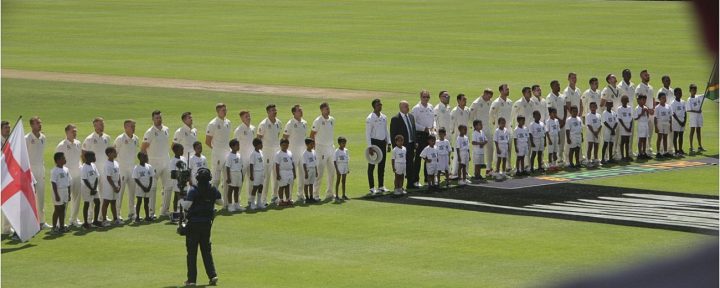I don’t like being this cynical and exasperated. I really don’t. But over the last few weeks Paul Downton and the ECB have got every major decision utterly, utterly, hopelessly wrong.
First they alienated the vast majority of fans by sacking Kevin Pietersen (yes, he’s a big head, but it’s clear from the testimony of Tremlett, Carberry, Swann and others that KP was not the reason why England lost the Ashes).
Then they astounded the world with the ridiculous appointment of Peter Moores on the basis that “he was crap last time, but track records don’t matter”. Why not bring back Norman Lamont as chancellor?
And now, surprise, surprise, they’ve alienated the county chairman, particularly those of smaller counties, with the illogical decision to appoint Angus Fraser and now Mick Newell as selectors.
Well, I suppose they’ve stuck two fingers up at everyone else, so why not the counties and their members too?
Both Newell and Fraser are good men, don’t get me wrong, but they are utterly unsuitable as selectors.
As Mike Selvey argues succinctly in this article, which he wrote after Ashley Giles’ appointment as a selector in 2008, men who are employed full time by a county simply cannot make good selectors – no matter who they are.
Being a selector, a proper one anyway, requires (a) the freedom to watch key players perform on different days at appropriate times of the season, and (b) unarguable impartiality.
Neither Fraser, not Newell – just like Giles before them – can meet either requirement, let alone both.
A big part of a selector’s job is to examine the current form of prospective players immediately before England squads are announced. This requires the ability to drive around the counties at a moment’s notice to watch different players with their own eyes.
In theory, a selector might have to be at Trent Bridge on a Thursday to watch James Taylor, New Road on Friday to watch Moeen Ali, Headingly on Saturday to watch Gary Ballance, and then Old Trafford on Sunday to see how Simon Kerrigan is shaping up.
Newell and Fraser will be unable to do this because they are full time employees of Notts and Middlesex respectively. If their counties are playing that week (and let’s face it, that’s pretty much every week during the summer) they will be with their primary employers the majority of the time – watching and geeing up their regular charges.
In effect, therefore, they are largely incapable of fulfilling their duty as selectors fully. They will frequently not be able to watch the players they need to watch, at the time they should be watching them. Instead, they will often have to rely on second and third hand evidence, reading the newspapers, and checking scores on teletext.
Of course, they could pick up the phone and talk to coaches at other counties, but why would Jason Gillespie, for example, tell Mick Newell all about the strengths and weaknesses of Gary Ballance (the areas of his game he’s currently struggling with etc) when Yorkshire are due to play Notts in a couple of weeks time? How impartial will that chat be – unless, of course, it’s just a vague discussion that reveals nothing particularly valuable (in which case why bother?)
As Selvey’s article states, being an England selector should be a full time job. How on earth can they perform their duties properly if they are employed full time elsewhere? The mind boggles.
Now we come to the second issue: conflict of interest. I needn’t go into this too much as the conflict is so clear, so unambiguous, and so brazen, that it defies basic rational thought to argue otherwise.
Newell and Fraser are good men, so they would not deliberately misuse their position, but how can they be 100% impartial if calling up Taylor or Robson for England (for a meaningless ODI for example) means pulling them out of a crucial fixture for their county? There will always be some prejudice – even if this is entirely subconscious.
What if Notts need to win their remaining championship games to win the title or stay in division one? Even if there is no bias whatsoever, no matter how slight, what will the perception of ordinary fans be if Taylor is spared from England ODI duty while Woakes, or whoever plays for Notts’ main rivals, is indeed selected.
The whole situation is far too messy. Indeed, one wonders why good men like Newell and Fraser would even want to put themselves in this awkward position. When Tom Graveney was an England selector, his beloved Gloucestershire offered him a job. He turned it down because it compromised his impartiality.
Are we to assume that both Fraser and Newell are better men than Graveney? Even if they are somehow impervious to the pressures of representing their counties first and foremost, perceptions are important – especially when a board so utterly lacking in credibility as the ECB is involved.
Ashley Giles created a good deal of ill feeling by taking on dual roles – so much so, in fact, that when Geoff Miller stepped down as chairman of selectors at the end of last year he explicitly advised the ECB never to make the same mistake again.
Unsurprisingly, however, the ECB have once again decided to ignore all criticism and tell the rest of the world to go hang. Since Miller abdicated his role, England have appointed two selectors – both full time supremoes at major counties.
If the reaction to Giles’ appointment is anything to go by, the counties will be furious that Newell and Fraser have joined the selection panel. Back in 2008, the Gloucestershire chairman John Light wrote an angry letter to Hugh Morris complaining about Warwickshire’s aggressive pursuit of two key players. You’ll find some quotes and analysis here.
The implication, of course, was that Giles’ role as a selector gave players an extra incentive to move to Warwickshire. Leicestershire were also bitterly disgruntled when Giles tried to recruit James Taylor a couple of years ago.
It seems to me that there are only two defences for making such illogical, divisive appointments:
The first is that nobody actually wants to be a selector these days (and the ECB are lucky to get anybody willing to do the job). I’m afraid I don’t buy this.
Ashley Giles almost managed to land the permanent England head coaches job on the back of being a selector – after all, it provides an excellent opportunity to become one of the ECB’s boys. One assumes that Mick Newell is trying to do exactly the same thing. By becoming a selector he knows he’ll be in pole position to take over from Peter Moores in a couple of years time (or sooner!). You can’t blame him.
The second defence is that the role of selectors has changed now. Maybe they’re not actually required to watch players repeatedly anymore? Maybe having your ear to the ground, being close to county cricket, possessing a large number of contacts on your mobile is enough?
Of course, this argument is clearly inadequate if you look at how modern cricket has evolved. These days test teams lean on a mountain of stats and analysis of players. Attention to detail is portrayed as everything. It seems counterintuitive that selecting players for England would require less primary evidence than any other job within the England camp.
The bottom line is that Newell and Fraser cannot make sound decisions about players they will only watch in the flesh perhaps two or three times a season – predominantly when their counties, eventually, come up against them. The timing of this, of course, will be entirely random.
And what about someone like Moeen Ali, who plays in the second division? Both Middlesex and Notts play in the top tier, so when exactly are either Fraser or Newell going to find time to visit New Road during a round of championship matches – let alone in the week before an England test squad is named? It might be possible, if Fraser can get away from Middlesex for the odd day, but is this really good enough? Will the evaluation process be thorough enough?
I think the obvious point is this: part-time selectors (or should that be very-part time selectors) who are attached to particular counties cannot do the job justice.
What’s more, we should mention that two of England’s three selectors (three of four if we include Moores) have no real experience of international cricket. James Whitaker’s single cap counts for little.
Having extensive experience of international cricket is not the be all and end all, but it surely helps, right? Or have us fans got it all wrong again? I suppose Mr Clarke thinks we should just move on.
James Morgan









[…] Full Toss has a very good article on the selection of Mike Newell as the new selector. I find the decision “a bit odd”, but then again, compared to other decisions recently, […]
Just got a few interesting snippets from @NHoultCricket (of The Daily Telegraph) via twitter. The good news is that Gus does have some ability to leave Middlesex games, as he doesn’t do match day coaching. His freedom of movement therefore isn’t as bad as it could be … although it’s not as good as it should be either. In an ideal world, selectors should be full time. It’s not like the ECB are short of a few bob.
The other interesting thing is that apparently approx 90 people applied for selector job that Fraser landed. We all know that Gus is highly knowledgeable, but surely there was a candidate where there would be no conflict of interest?
If anyone has any further insight into this topic it would be much appreciated. It’s an important one to debate, and to be honest I’m really surprised that it has received so little attention given that so many test places are up for grabs at the moment.
I believe the explanation is simply that selection is not, in fact, a full time job at all. Miller’s gang came up with a low maintenance scheme: you choose 11/12 players you like (nice ethics, bland in media interviews, able to lift heavy weights in the gym) then you announce “these are the best players we have” along with “Consistency is the way to success”. After that you select the same team everytime – 5 minutes, job done.
You could be right about this. I would have thought that in England’s current predicament, where half the team will be different in the first test, we need full time selectors. Also, because the T20 squads and ODI squads are so different from the test teams, part time selectors (who have to be with their counties much of the time) can’t possibly keep a close eye on a pool of 30 odd players.
I think Benny’s comment isn’t far off the mark. About ten, fifteen years ago they decided the way to win (and the answer to the horrors of the 90s) was to pick a squad and stick with them, pretty much come what may.
Since then they’ve only ever really been looking at maybe one or two players at a time as possibles for the future. I suspect they spend far more time on the limited overs squads than the Test squad, especially as they basically pick new Test players from the short format teams.
There have certainly been long periods over the last ten years in which absolutely no selection questions were even considered re the Test team. Sometimes that was justified, sometimes it went far too far, probably as a reaction, an over-compensation, to the ’29 players a series’ era.
I agree with the basic thrust of your argument, though. I think Fraser would be an excellent selector all things being equal, but they’re not.
The system we are moving towards is one where all prospective England players are “placed” in a county that is run by a national selector.
I don’t necessarily think that the ECB are sticking ‘two fingers up to the smaller counties’. Whilst Fraser and Newell are very knowledgeable, particularly when it comes to their counties’ players, surely there must be 2 out of the 90 that applied for the job to not have a conflict of interests as these two have.
Re: sticking two fingers up, the counties were upset when Giles was appointed so I assume they are upset with Newell / Fraser too.
[…] 28th. As if the England set-up isn’t already incestuous and sclerotic enough as it is, Mick Newell is appointed as selector. […]